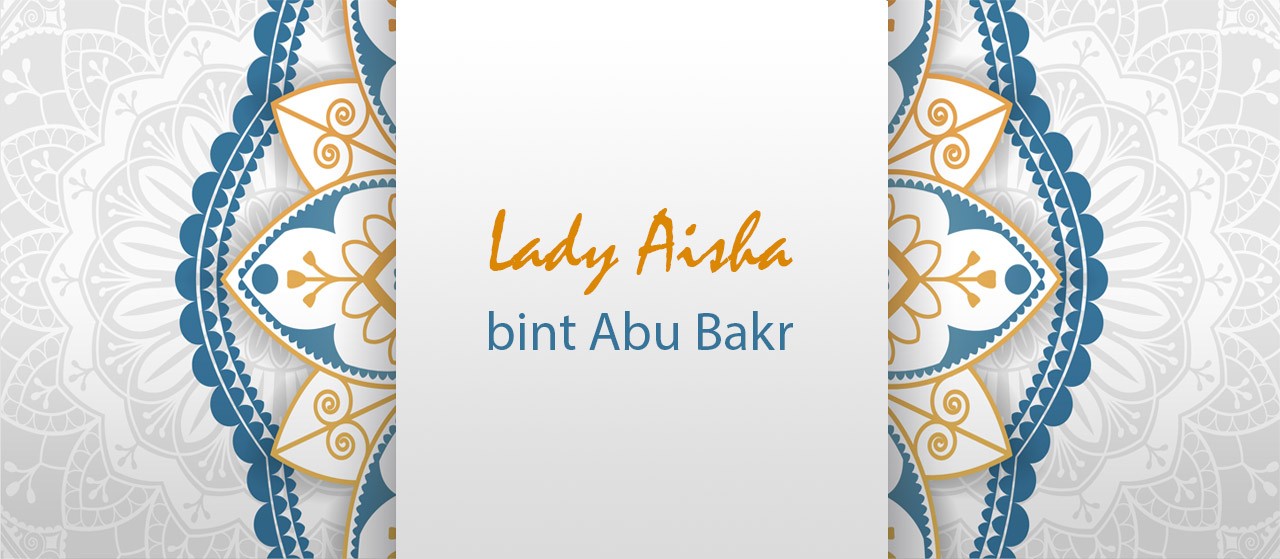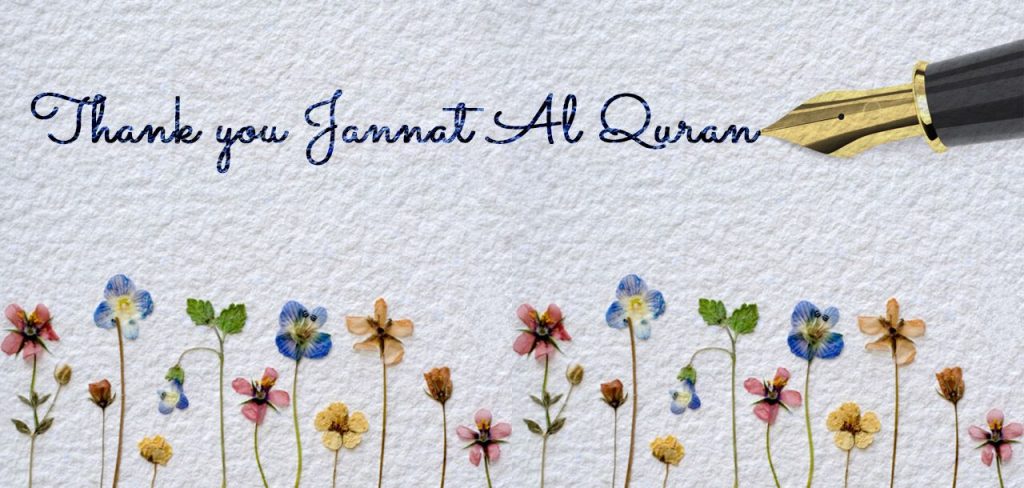Lady Aisha bint Abu Bakr
The story of Aisha bint Abu Bakr (RA) is one of knowledge, strength, courage and companionship. She was the youngest wife of our beloved Holy Prophet (PBUH), a devout Muslim, a reputable scholar, an educator, a leader and a source of great knowledge for Muslims across the globe. She remains an extraordinary role model for women to this day, owing to her strong character and zeal, along with her endless contributions in the development of Islam, Islamic tradition, its interpretation and transmission. And most importantly, she held a great place in the heart of our Holy Prophet (PBUH).
Narrated Amr bin al-Aas (RA):
I came to the Prophet (PBUH) and said, “Who is the most beloved person to you?” He said, “Aisha.” I asked, “Among the men?” He said, “Her father” (Sahih Bukhari 5:57:14)
Aisha (RA) was born to the Holy Prophet’s closest companion, Abu Bakr (RA) and Umm Roman (RA). As a result, she grew up in a Muslim household in Mecca as her father was one of the earliest converts of Islam. Aisha (RA) showcased great intelligence and an eagerness to learn from a very young age. On one occasion during her childhood which is narrated by Aisha (RA) herself:
When the Messenger of Allah (PBUH) arrived after the expedition to Tabuk or Khaybar (the narrator is doubtful), the draught raised an end of a curtain which was hung in front of her store-room, revealing some dolls which belonged to her. He asked: What is this? She replied: My dolls. Among them he saw a horse with wings made of rags, and asked: What is this I see among them? She replied: A horse. He asked: What is this that it has on it? She replied: Two wings. He asked: A horse with two wings? She replied: Have you not heard that Solomon had horses with wings? She said: There upon the Messenger of Allah (PBUH) laughed so heartily that I could see his molar teeth (Sunan Abu Dawud 43:160).
This only exhibits the sharpness of mind and wit that Aisha (RA) possessed since she was a child. The match of the Holy Prophet (PBUH) and Aisha (RA) was made in the Heavens and was by Divine decree. The Holy Prophet (PBUH) saw Aisha (RA) in his dreams as a divine revelation:
Narrated by `Aisha (RA):
Allah’s Messenger (PBUH) said to me, “You were shown to me twice (in my dream) before I married you. I saw an angel carrying you in a silken piece of cloth, and I said to him, ‘Uncover (her),’ and behold, it was you. I said (to myself), ‘If this is from Allah, then it must happen.’ Then you were shown to me, the angel carrying you in a silken piece of cloth, and I said (to him), ‘Uncover (her), and behold, it was you. I said (to myself), ‘If this is from Allah, then it must happen’”(Sahih Bukhari 91:30).
Thereafter, Khawlah bint Hakeem (RA) suggested the marriage proposal to Abu Bakr (RA), who happily conceded and so did the Prophet (PBUH). Soon after, Aisha (RA) became the Holy Prophet’s (PBUH) youngest and third wife. The marriage, however, was only consummated once she reached puberty. She was most beloved amongst the wives of the Holy Prophet (PBUH) and was known to be his favorite.
The relationship between the Messenger of Allah (PBUH) and Aisha (RA) was of great love, affection, playfulness and intimacy. According to hadith traditions, they used to race each other and the Prophet (PBUH) would sometimes let her win when she was young, but she also bested him on occasions later on. The Prophet (PBUH) also received several revelations while they were lying under the same blanket in tranquility- she was the only wife with whom revelations were sent in such circumstances- and it was her chambers that he wished to be moved to when he felt death approaching.
Once, when Aisha (RA) accompanied the Prophet (PBUH) on one of his caravans, she left the camp to relieve herself and by the time she returned, the caravan had packed up and left. She found herself stranded in the desert. She then stumbled upon Safwan bin Mauttal, who was in charge of trailing behind the caravan to gather the leftovers. He recognized her and asked her to ride on his horse whilst he walked beside her to escort her back to the caravan safely. The unbelievers saw this as an opportunity to spread rumors of adulteration regarding Aisha (RA) and accused her of immoral acts. Even the Prophet (PBUH) became overwhelmed by the sheer intensity of the circulating rumors. However, Allah (SWT) came to Aisha’s (RA) aid and proved her innocence once and for all through revealing the verses 11-20 of Surah Al-Nur in the Holy Quran, putting the rumors to rest.
In 11th AH, the Prophet (PBUH) fell severely sick. During his sickness, he preferred the company of Aisha (RA) and it was in her arms when he breathed his last. She was only 18 at the time.
Narrated by Aisha (RA):
During his sickness, Allah’s Apostle was asking repeatedly, “Where am I today? Where will I be tomorrow?” And I was waiting for the day of my turn (impatiently). Then, when my turn came, Allah took his soul away (in my lap) between my chest and arms and he was buried in my house” (Sahih Bukhari 2:23:471).
She continued to contribute to Islam even after his death. Having grown up with the Prophet (PBUH) and having lived in close proximity to him, she had the chance to observe his sayings and actions very closely. Owing to her sharp memory, she became the fourth highest narrator of hadith of the Prophet (PBUH) and narrated up to 2000+ hadith. Several of the authentic ahadith found today stem from her. Scholars believe that one-fourth of the shariah principles were narrated on Aisha’s (RA) authority and she was consulted on matters of law and religion by the caliphs on multiple occasions- such was her knowledge. She took an active part in educational reforms and acquired many students under her guidance as well.
Her life took a drastic turn when Ali ibn Abi Talib (RA) became the fourth Caliph of Islam. Aisha (RA) wanted to avenge the death of Uthman ibn Affan (RA), the third Caliph, and bring the killers to justice, hence, she took up arms against Ali (RA) in the Battle of Camel. She faced defeat and thereafter retreated to Medina and retired from her public positions from then on. She then spent most of her time in religious transmission, interpretation and formulation of Islamic law.
Aisha (RA) passed away on the 16th or 17th of Ramadan, 58th AH. She was buried in Jannatul-Baqi.
Aisha’s (RA) life is mere proof of the strength and resilience of women and the extraordinary feats they are capable of. Her life is a proof of the fact that leadership and inspiration are irrespective of gender roles. She was a champion of Islam and a shining example in the history of Islam. She remains, to this day, the “mother of the faithful” and does justice to her title.
Written by Ustatha Menna Kotb
Please visit our website: www.jannatalquran.com



May I simply say what a relief to uncover somebody that really understands what theyre discussing over the internet. You certainly know how to bring a problem to light and make it important. More and more people really need to check this out and understand this side of the story. I was surprised that youre not more popular because you certainly have the gift.
I was pretty pleased to uncover this great site. I want to to thank you for your time just for this wonderful read!! I definitely liked every little bit of it and i also have you book marked to look at new information in your blog.
I would like to thank you for the efforts youve put in penning this site. I really hope to view the same high-grade content by you later on as well. In fact, your creative writing abilities has inspired me to get my own website now 😉
Muchas gracias. ?Como puedo iniciar sesion?
Thanks for sharing. I read many of your blog posts, cool, your blog is very good.
Thanks for the marvelous posting! I really enjoyed reading it, you happen to be a great author.I will make certain to bookmark your
blog and will eventually come back later in life. I want to encourage you to ultimately continue your great writing,
have a nice afternoon!